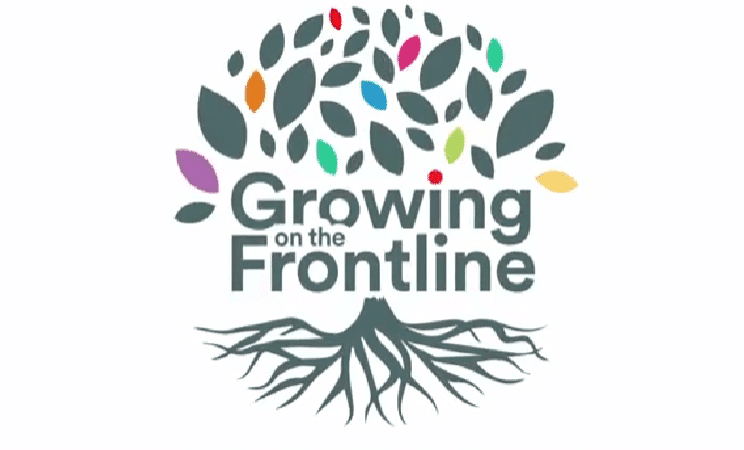An interview with Charles Hippsley, co-creator with his wife Mary of a major new course from the London Institute for Contemporary Christianity (LICC), Growing on the Frontline.

Would you be happy to share about your background?
Mary and I are both experienced in spiritual formation and helping people to grow in their walk with God. One of the ways we do this is through our work as Spiritual Directors – a one-to-one ministry that functions alongside the wider discipleship of the church (Sunday worship, small groups etc.).
Mary has been an RE teacher and then lectured for a Bible college. She has a degree in theology and a masters in Christian spirituality. My background is in business and financial services, but I’ve always had a strong desire to connect Christian faith with all of life, including work. I was able to join LICC 11 years ago as the Work Forum Director, helping people to be fruitful in and through their jobs.
What inspired the new course? What is its purpose and focus?
This course emerged in the wake of another LICC resource, Fruitfulness on the Frontline, which launched in 2014. That resource helped people recognise that God is interested in what they do in everyday life and work, and that it’s a place where we bear fruit with and for him, day by day. It also helps to fire the imagination about what that fruitfulness might look like, walking through six ‘M’s that we all do but might not notice – things like modelling godly character and being a mouthpiece for truth and justice.
After a while though, we found that some people were struggling to put those things into practice, and began to ask ourselves why. It turns out that it’s one thing to know what fruitfulness looks like, but it’s another thing to have the freedom and maturity to be able to produce the fruit!
For example, in working life there have been times when I’ve known I should be speaking up and saying something, but I don’t. What’s stopping me? Why don’t I say something? Or perhaps I notice that someone is struggling but I find myself too busy and short of time to help. Why is that?
So, the new course – Growing on the Frontline – asks: what might be getting in the way of our fruitfulness and why? It takes an inward sweep for an outward application, taking us inside ourselves with the goal of releasing a greater freedom to be fruitful. And it recognises that everyday life is not only a place we can bear fruit, it’s also a place we can grow with God’s help.
There’s quite a lot about choice and desire in the course and there’s also a lot of older prayer practices like lectio divina and the examen. Can you say something about these dynamics?
Yes, the course works in two halves. There are eight sessions. The first four sessions use contemporary stories and biblical texts to help us diagnose what’s getting in the way of us being fruitful for God. Then the final four offer some treatment, some solutions to help us get past those obstacles. How do we grow? How does God work with us to draw us into greater freedom?
So, in the first half we start with the idea of choice. Our fruitfulness is influenced by the choices that we make. We invite people to put themselves into the infamous story of Adam and Eve. What were they thinking? Why did they make the choices they did? And then we invite people to think about why we make the choices we do. Why might we feel we’re too busy rather than making time to help, for example?
Then we step down a level and look at desire. The desires that we carry can drive our choices. To unpack that concept, we explore the story of the priest, the Levite, and the good Samaritan. What were the desires that governed their choices?
After that, using the account of Jesus’ temptations in the wilderness, we explore some of the common desires that we all face: for safety, approval, and the desire for some control or agency in our lives. And we ask – how can those things, fine in themselves, sometimes get in the way of us doing the things that we might want to do to help others? For example, in a situation where we need to stand up for justice, it might be a desire for approval that gets in the way and stops us. We don’t want others to think badly of us if we ‘go against the flow’.
And throughout the whole course, we use simple prayer tools chosen to help us reflect on what’s happening in and around us, receive God’s wisdom, invite him to renew us, and then respond well to the opportunities around us.
In the first half of the course, we use some ancient practices: the Prayer of Examen to help us reflect with God on what’s happened in our day, and Lectio Divina to help us receive wisdom for everyday life from God’s word. Then in the second half of the course we use the Renewal Prayer to help us to engage with God and invite the work of the Spirit to help us grow in freedom.
Finally, in the last two sessions of the course we use a practice called PAUSE (Pause-Acknowledge-Understand-Surrender-Engage), which has been specifically designed for this resource and is perfect when you’re right there in a situation and you need to respond. It helps you to stop, recognise what might be hindering you from acting like Jesus, let go of that, and engage fruitfully.
What’s the format of the course?
Growing on the Frontline is designed for church small groups, and it’s really easy to use – you just need a copy of the discussion guide for everyone in the group, and access to the accompanying videos online or on DVD. Each session is built around three short films, presented by Tim Yearsley and Ennette Lainchbury, who bring their experience of helping others to grow in God. As you go through each week’s material, you get in-depth teaching from Tim and Ennette, watch real-life stories from Christians in all walks of life, dive into the Bible, discuss as a group, and spend some time using the prayer tools I mentioned earlier.
The great thing, though, is that it doesn’t stop when your small group ends. We’ve provided some really helpful stuff like audio guides and journaling prompts so people can do what it says in the title – keep growing on their frontlines, in their ordinary everyday lives!
A final question: the Church has been good at helping people share their faith, and to explore faith. Why is it more difficult to help people deepen our faith and discipleship?
In the more outgoing parts of the church, we’ve perhaps been less good at noticing what’s happening within us. We have had a great focus on how we can reach out and connect with others, which is fantastic. But perhaps we haven’t paid as much attention to ourselves. Sometimes we can even feel guilty about doing that because it can seem introspective and a waste of time. But when done in a healthy way, it can set us free from those things that can constrain and corrupt our best intentions – and actually make us more effective in in sharing our faith and helping others to explore it.
